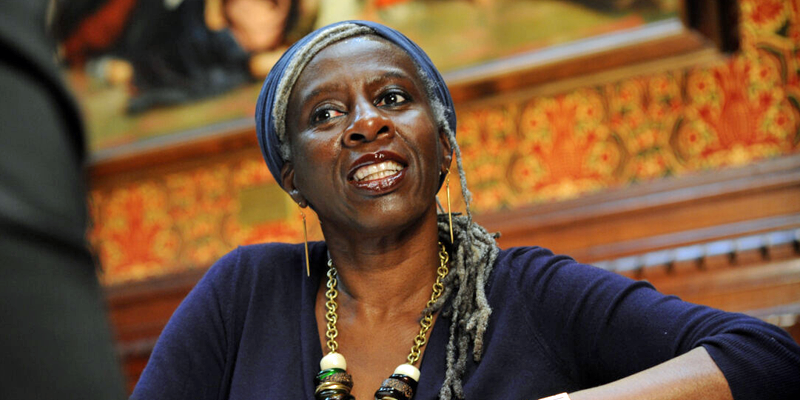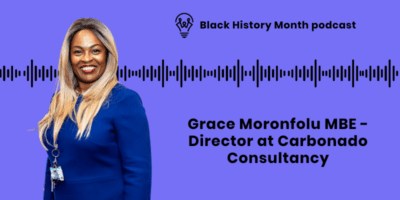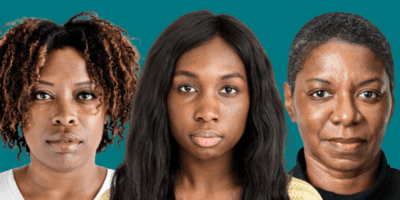Baroness Lola Young is a British politician and member of the House of Lords. A proud Londoner, she has had a long and distinguished career in the arts and public service. As a passionate advocate for equality and social justice, she has been actively involved in campaigns and initiatives to promote diversity and inclusion throughout her career, and the main focus of her work currently is trying to combat modern forms of slavery and trafficking as they relate to businesses.
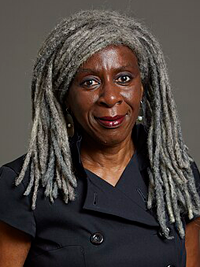
“I’m always inclined to think about the collective, as Black History Month is not about any individual. That’s not to say there aren’t individuals who are totally brilliant, utterly brave and committed, absolutely there are, but we don’t know about so many groups of women, so I think this year, as part of the Saluting Our Sisters theme, we should pay tribute to them.”
Campaigning with passion and purpose
I’m a Londoner and I was brought up in the care system. Mine was not an easy childhood, fostering and then children’s homes. I was independent at 18 and since then I’ve had a variety of jobs and careers. I was an actor for several years before I became an academic. I’ve also worked across several different cultural and creative organisations, either sitting on boards or advising. Then when Tony Blair introduced the idea of the ‘People’s Peers’, I thought that sounded like a good thing, so I went for it and I was appointed.
Today, my main focus through the House of Lords is the work that I do around trying to combat modern forms of slavery and trafficking as they relate to businesses, the side that has to do with exploitative and abusive labour practices in company supply chains. I’m interested and engaged with how businesses are complicit in some of these practices and I’m trying and get them to shape up.
I’ve done most of that work with the fashion industry and it just so happens that I love clothes and fashion but I was horrified to find out some of the things that go on. I’ve also been working around the issue of the over-representation of young black men in the criminal justice system and the experiences of care leavers, as I have a personal interest in that.
I co-chair a grant-giving foundation based in the East End of London, and I’m also a non-executive director with Bloomsbury Publishing and with a sustainability agency called Futerra.
Overview of the House of Lords
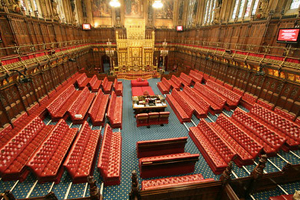
Here’s an overview of the House of Lords, which some people call ‘the second chamber’, or ‘the upper house’. I must confess that before I went into Parliament, I didn’t have a very clear idea of how things worked but it’s fascinating to fit everything together in order to understand the whole structure.
There are two parts of the Houses of Parliament located within the Palace of Westminster. One is the House of Commons, which is the elected house, where MPs will represent their constituents. There are currently 650 members of Parliament.
Then there’s the House of Lords. Members of the House of Lords are appointed rather than elected. When we are appointed, we are appointed for life. The House of Lords comprises of the main political parties, so Liberal Democrats, Labour, and Conservative, but I belong to a group which is called the ‘crossbenchers’ or ‘independent crossbenchers’, and we are politically independent. That doesn’t mean to say we’re neutral or apolitical, but it means that we’re not subject to the people who manage the political parties, known as the party whips.
The main work of the House of Lords is to scrutinise legislation. So, the government brings in a bill, a proposed piece of legislation, in the House of Commons. When they’ve done their debating and amending it, they throw it over to us and we go through it line by line and say: “Yes”, “no”, “maybe”, “let’s talk”, or whatever. It’s quite a complicated process.
I won’t go into all the different levels of scrutiny that there are, but that’s our main job, and so something like the Modern Slavery Act (2015), starts off as a bill (so the Modern Slavery Bill), and then when both the Commons and the Lords have agreed on all the sections and clauses and all the rest of it, it gets passed, and it becomes an Act.
From ‘Bill’ to ‘Act’ is quite a long process, and it’s very detailed. We go through it line by line to try and make sure there are no unintended consequences, and that everybody understands what it’s meant to do and how it works.
Day-to-day role in the House of Lords
When I joined the House of Lords, I had to make a decision — once I saw how things ran and how things worked — about how I could make the most impact. I needed to find my place within the organisation. I realised there maybe wasn’t so much about arts, culture and creativity, but there were other kinds of legislation that I was particularly interested in, so anything around children and families that affects children and young people in the care system or care leavers, as well as modern slavery and so on.
I used to go in every day but COVID changed the way many people use the building. As I’m able to work remotely I’m more selective about when I physically go in, but on a typical day, if I’m not involved in actually speaking, I will attend and listen to questions. We have our own Question Time. It is very different to the House of Commons and is definitely worth a listen. It’s much easier to come in and attend because not so many people know about it.
After question time there might be a debate about something, like procurement, for example, where organisations, government departments and local authorities buy in services from companies. I might listen to that or contribute in terms of the way we think about procurement and the clauses we might build into the legislation at a future date.
These clauses might say that if you’re a company tendering for government business or local authority business, you cannot do so unless you can satisfy us that you have very robust anti-modern slavery protections in your supply chains. We’ve been campaigning to make them more effective for some time. So, I would listen to that debate and I would say something about the importance of the issue of tackling modern slavery, in all its many forms.
Then, maybe later in the day, I might host a roundtable. I do a lot of work in fashion, as I mentioned earlier, and I often hold roundtables around that subject area with brands, and it’s all focused on trying to get them to be much more rigorous and do much more due diligence to ensure that we don’t have the kinds of tragedies in fashion supply chains that we’ve seen over the years. There’s also the awful child labour and so on that goes on, particularly, but not exclusively, in fast fashion.
Holding the fashion industry to account
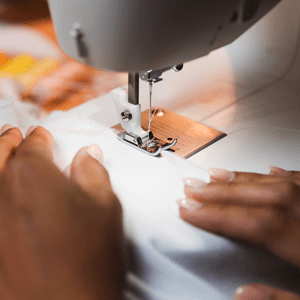
I don’t want to be wearing clothes that have been produced by children. To make things worse, many of these children may have been forced to work for 12 hours a day. And there are many other people who don’t want to be complicit in bad labour practices either. We have to be able to trust the brands not to work in this way.
I speak at lots of conferences around that subject too, where I talk with policymakers, people in government, and the civil service officials who are responsible for these areas. This issue is increasingly connected to environmental sustainability, so the big thing for me I’m working on at the moment is researching into how we get legislation that protects vulnerable people, whether that’s here or overseas, from being sucked into various exploitative labour systems and working in supply chains, as well as from environmental pollution for them individually, but also for their wider communities. So, it’s a pretty big ask.
We have something called Private Members’ bills, also known as PMBs, where any member can say: “I’ve got a Bill.” It’s very unusual for the government to take up and support a private members’ bill, and without that support, you won’t get it passed. So, what you have to do then is to get that subject aired and make it into a bit of a campaign, to raise awareness.
With the fashion and other business sectors, what we’ll be aiming to do is to galvanise companies by saying: “You can’t carry on in the way that you do, both polluting and contributing to climate change as well as using abusive and exploitative labour practices in your supply chains.” It’s simply not a good enough defence to say: “Oh well it happened overseas, and it was in the third tier of our suppliers.” What we want is legislation that says you’ve got to do something about it before it starts. You’ve got to be pre-emptive and proactive, so that’s what I’m working on at the moment.
Making the House of Lords more representative
Representing the diversity of the UK is one of the big problems with the current systems. A lot of people don’t find this as problematic as I do, but I think it’s about time we reformed the House of Lords because it’s entirely wrong that we’re in there for life and we’re not even elected.
I have different positions on what that reform might look like. It might be elected in some way or another. Under the current system, members have a longer-term view than the House of Commons as, if you’re an MP, you’re already thinking about the next election as soon as you’ve been in post for about a couple of years.
The issue of reform is always going to be tough because I know that a lot of people will say the House of Lords does do a good job in as much as it doesn’t let the government get away with whatever it wants to do. That scrutiny and that holding to account is a vital function but I do think there has to be a way of making it more democratic and more representative.
I’ve heard colleagues speak about young people, for example. What do young people think and feel? I’m not saying that because you’re old, you can’t ever identify with that, but we need people with the lived experience to say: “Actually, you know what, growing up in Hackney/Preston/rural Suffolk, this is what it was like.” And not in rural Suffolk unowning a mansion, but in rural Suffolk as a quote-unquote ‘ordinary person’. We don’t have a big enough spread of people with different kinds of lived experience, and I think that’s absolutely crucial when you’re looking at legislation.
Understanding more about the way seemingly disparate Black histories are intertwined
I remember when Black History Month was first introduced in the UK in 1987 and at the time thinking: “What is Black History in Britain?” What Black History Month has done is to contribute to people thinking about and researching whole areas that they never really looked at before. So, for me, when I first read Staying Power: The History of Black People in Britain, written by Peter Fryer (a white male journalist) it was amazing!
I think raising the levels of consciousness and awareness about how these seemingly disparate histories are actually very intertwined is extremely important. In its early days, the purpose of Black History Month wasn’t always clear. Did it include people from South Asian heritage, for example? It was all a bit confusing, but over time it’s been distilled into something that’s more useful.
I must confess, I’m still a bit ambivalent about it but I think the most important thing for me is that it shouldn’t be seen as an end in itself, but more as a tool that is contributing to something that’s greater, rather than having one month where you think specifically about it.
Because of my background as an academic and as somebody who always likes to try and appreciate the complexity of these issues, it’s most important to drive towards a better understanding of where we’ve gotten to today, reflecting on where we’ve come from. And that wasn’t just on The Windrush in 1948. I do feel, and a number of Black people have said this now, that focusing everything on Windrush is not the answer to addressing these big themes and issues around the Black presence in Britain. It’s a contributory factor but we need to go much further back in order to understand how we’ve reached the position we’re in now.
Black History Month: Saluting Our Sisters
I’m always inclined to think about the collective, as Black History Month is not about any individual. That’s not to say there aren’t individuals who are totally brilliant, utterly brave and committed, absolutely there are, but we don’t know about many groups of women, so I think this year, as part of the Saluting Our Sisters theme, we should pay tribute to them. (Firstly, may I make a small apology that all of the organisations I’m about to mention are all London-based as they were active as I was growing up so they are some of the stories I’m most familiar with for that reason.)
For me, discovering my own political consciousness in the 1970s and 80s, I thought about the Women of Grunwick, who many people might not even have heard of. Grunwick was a photographic processing plant in Brent, North London, which was mainly staffed by women of South Asian heritage. At the time, and still to some extent today, there’s a myth about passive, oppressed women who just do what their men tell them, and go out to work for pin money. But these women at Grunwick were anything but stereotypes.
They were unwilling to accept the degrading treatment that was typically handed out to ‘unskilled’ non-white immigrants in workplaces in those days and came out on strike for one of the longest industrial disputes in British history, and at a time when trade unions were all led by white men.
I also thought about other organisations like OWAAD, the Organisation for Women of African and Asian Descent. At a time when there was a big threat from the National Front and the growing threat from other proto- or neo-fascist organisations and political groupings, Black and Brown women were at the forefront of the suffering that brought about.
Much is written, quite rightly, about Black male youth from those periods, but there is very little in the public domain about what happened to women of colour during that period, so that was a pioneering organisation.
The other organisation, I’d like to mention, which is still going strong, is Southall Black Sisters, although I read a distressing account of the recent experience of one of their members when she was travelling on the Tube in London.
To me, it’s just the idea of a collective. It’s about a group of women who come together and say: “Enough is enough. We’re not going to sit in the corner crying anymore. We’re going to take action and we’re going to do it in the way that is appropriate and feels right for us.” The women in those collectives are really the source of inspiration for me.
Don’t give up
Members of the Womanthology community are welcome to reach out through my House of Lords webpage.
My message to the Womanthology community is very simple: “Don’t give up.” Don’t give up on positive change and getting out of the boxes we’ve been placed in for so long. Change needs to happen and we’re the ones who can make it happen more quickly.
I think about the suffragists and the suffragettes. I think about the abolitionists. They never gave up, otherwise, we’d still not be able to vote, and many of us would still be in chains. I’d say don’t give up on the political system: if we get involved we really can improve it. Let’s be inspired by those who came before us and never gave up.
Header image © House of Lords

